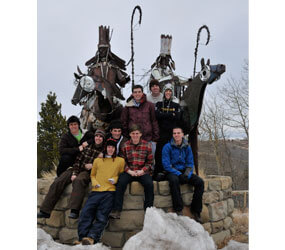Experience is the best teacher for students enrolled in Baltimore Catholic high schools’ programs that offer young people hands-on practice in everything from medicine and engineering to tutoring and carpentry. Calvert Hall College High School in Towson and Seton Keogh High School, Institute of Notre Dame and Mercy High School of Baltimore are among the schools designing curricula that take kids out of the classroom.
“There’s a big difference between book learning and experiential learning, “explained Religious Sister of Mercy Carol Wheeler, president of Mercy High School Baltimore, which has teamed with Mercy Medical Center to develop its Women in Medicine program.
Women in Medicine is accepting applicants from the school’s upcoming freshmen class in fall 2010. The program will mean monthly trips to Mercy Medical Center for the girls in the four-year program as well as classroom instruction in biomedicine plus group and one-on-one discussions with MMC women leaders.
The program will not only give students an introduction to the newest health care technology, it will give them the opportunity to interact with patients. The school already had a relationship with Mercy in the form of less structured mentoring and service programs. This new program grew out of that relationship.
“Some girls in the mentoring program are absolutely convinced that this is what they should do. And others learn it’s not,” said Sister Carol.
Girls’ high schools IND and Seton Keogh have also implemented biomedical programs using a curriculum developed by the non-profit organization Project Lead the Way. Seton Keogh also has an engineering program, and its classes are open to boys from Cardinal Gibbons. Both IND’s and Seton Keough’s Project Lead the Way programs are fairly classroom-centered in the first year, but they will involve more organized out-of-school learning as the kids move through the programs.
“Experiential learning itself is not new. Back in the 1960s, when I was a young teacher, I remember a trip to a hospital and the impact it had on me as well as the girls,” said Sister Carol. “What’s different is it’s getting a little more organized now.
That is definitely the case with Calvert Hall College High School’s immersion program, a service-oriented program in which students spend a week immersed in a completely different culture within the United States. The program began as a spring break service trip to Virginia for Habitat for Humanity. But it has branched out into four different trips with learning opportunities both before and after the expedition.
The trips are to rural Virginia, Camden, NJ, the reservation of the Blackfeet Nation in Montana and, coming up this spring, New Orleans. The programs are preceded by weeks of discussion, instruction and reading and then followed up by introspective writing in the form of a blog, www.calverthall.com/montana.
Each of these trips provides different lessons and environments. Virginia gives the kids hands-on building experience, the satisfaction of seeing the progress of a house’s construction and a window into the culture of rural America. Camden, NJ, where the boys do various jobs including working with younger kids and cleaning up neighborhoods, demonstrates some of the issues of urban environments. New Orleans will be a working trip in which the boys will learn more about the rebuilding efforts and issues of Hurricane Katrina.
Bert Catzen, a senior who went to Camden and is planning to go to New Orleans, said, “If I could pick one word for the trip it would be humbling. They did prep us a lot for the trip. But nothing compares to actually being there.”
Mark Parisi, Calvert Hall campus minister, explained, “An immersion program is great for this age. They like working with their hands and building things. But Montana is harder because you don’t get an immediate result.
“The Blackfeet Immersion trip is an entirely different trip, learning about a completely different way of life,” he said. “The challenge with that trip is being able to apply the situation and lives of the Blackfeet to their own lives back in Baltimore.”
Dylan Nugent, a senior who attended trips to Virginia and Montana, said of his trip to Montana, “I went into the trip thinking that our group was going to have a tangible impact on the reserve – that we were going to change it by ourselves. But I learned it is a process.”


